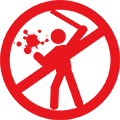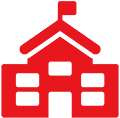DONATE MONEY FOR CHILD EDUCATION: HELP BUILD A BRIGHTER FUTURE IN INDIA
LET US BUILD A NATION WHERE EVERY CHILD LEARNS, THRIVES, AND LEADS THE FUTURE
Millions of children in India still grow up without the chance to go to school, explore their talents, or dream of a better future. At Bal Raksha Bharat, we believe that every child deserves quality education – from their first steps to their final years in school. For over 15 years, we have helped over 2 million children learn, thrive, and stay safe. With your support, we can help thousands more build brighter futures through education. Bal Raksha Bharat builds impactful early learning programs for children from birth to age 6, helping them get ready for school and thrive. We strengthen school education for ages 8 to 18 with a focus on literacy, numeracy, and better learning outcomes. Our work also goes beyond classrooms; we keep children safe in and around schools, support learning in emergencies, and create safe learning spaces. Guided by the National Education Policy 2020 and India’s vision, we work to give every child a fair chance to learn and succeed, making India a global leader in education and knowledge.
Over the years, we have developed innovative, sustainable, and scalable solutions aligned with Government of India policies, enabling us to continue ensuring access to quality education for underprivileged children. In the last 16 years (January, 2010 – March, 2025), we have reached out to more than 2 million children.
For the 2025-27 period, Bal Raksha Bharat aims to ensure that 2.5 lakhs boys and girls (0 – 18 years) from the most marginalized communities and context have access to equitable, safe and quality learning in our geographies of operation
Here are our key pillars of building a solid foundation for children!
-
 EARLY CHILDHOOD CARE AND DEVELOPMENT (STRONG FOUNDATIONS FOR LIFELONG LEARNING)
EARLY CHILDHOOD CARE AND DEVELOPMENT (STRONG FOUNDATIONS FOR LIFELONG LEARNING)Bal Raksha Bharat aims to ensure that girls and boys (0-6 years old) demonstrate improved school readiness skills as a result of responsive caregiving and play based learning opportunities at home and centre.
Over 80% of a child’s cumulative brain development occurs before age 6, indicating the critical importance of appropriate care and stimulation of the brain in the early years to ensure healthy brain development and growth. Strong investment in ECCD has the potential to give all young children such access, enabling them to participate and flourish in the educational system throughout their lives.
Bal Raksha Bharat’s ECCD programming focuses on
1. ensuring smooth transition from Anganwadi Centres/ECCD Centres/pre-school sections to primary grades in school by enhancing school readiness among children aged 3–6 years.
2. working with Anganwadi Workers, parents/caregivers, and communities to foster holistic development at home and in centres through play-based learning and responsive caregiving.
3. child learning at centre and home, supported by contextualized training modules and activity calendars to build foundational skills in young learners.
4. 0-3 years old by engaging with caregivers on early stimulation and responsive care-giving.
-
 SCHOOL EDUCATION (SUPPORTING LEARNERS TO SHAPE THE FUTURE)
SCHOOL EDUCATION (SUPPORTING LEARNERS TO SHAPE THE FUTURE)
Bal Raksha Bharat aims to ensure that all girls and boys (6 – 18 years old) have access to quality and safe learning environment in schools.
As per the National Education Policy 2020, the curricular and pedagogical structure of school education will be reconfigured to make it responsive and relevant to the developmental needs and interests of learners at different stages of their development, corresponding to the age ranges of 3-8, 8-11, 11-14, and 14-18 years, respectively.
Working on the same, our programming for School Education emphasizes on
1. foundational literacy and numeracy in early years.
2. promoting remedial learning via Catch-up Clubs and after-school support.
3. for Grades 3 and above, we focus on 21st century skills and STEAM education through teacher training, mentorship, and real-world exposure.
Inclusive and equitable education – an essential goal – is critical to achieving an inclusive and equitable society. Gender equality, improvement in WASH facilities, community engagement, climate education, innovation and low-cost EdTech solutions remain integral to our programming. We advocate for quality learning across India through strategic partnerships, coalitions and child-led campaigns.
-

SAFE SCHOOL AND ANGANWADI CENTRES (NURTURING CHILDREN IN SAFE AND SUPPORTIVE SPACES)Bal Raksha Bharat aims to ensure “0” days loss in education for Children
Bal Raksha Bharat has adopted an all-hazards approach to keep children safe in and around school from natural and everyday hazards, and violence. Bal Raksha Bharat envisions a safe, inclusive, and resilient learning environment for every child—from early years to adolescence. It addresses the full spectrum of risks that children face in and around schools by adopting a ‘whole school’ approach, engaging stakeholders across all levels of the socioecological model (children, caregivers, teachers, school management, communities, civil society, and government authorities) to make both immediate and lasting improvements for children’s safety and protection.
In a world facing climate crises, disasters, and growing inequalities, our Safe Schools and Anganwadi Centres approach integrates:
1. Education in Emergencies (EiE).
2. Peace Education (Schools as Zone of Peace)
3. Comprehensive School Safety (CSS)
We focus on capacity building, risk assessments, and tech-enabled safety audits to ensure learning continuity during crises. Road safety education is embedded to empower children and communities with safe commuting practices.
India has continued to make notable progress in education since independence, though challenges remain. The Periodic Labour Force Survey (PLFS) 2023-24 estimates the national literacy rate for persons aged seven years and above at 80.9%, reflecting steady improvement but also highlighting persistent gender and rural-urban gaps. According to UDISE+ (United Information System for Education Plus)2023-24, the school education system in India currently caters to nearly 24.80 crore students across 14.72 lakh schools with about 98 lakh teachers. While these numbers reflect the vast scale of the system, total enrolment has slightly declined from 25.18 crore in 2022-23 to 24.80 crore in 2023-24, indicating the need to focus on retention. Dropout rates remain a concern, with 1.5% of children leaving school at the primary level, rising significantly to 12.4% at the secondary level. Encouragingly, progress has been made in gender equity: the Gender Parity Index (GPI) stands at 1.03 at the elementary level and 1.01 at the secondary level, suggesting near parity in school participation between boys and girls. Together, these trends underscore both India’s achievements and the critical areas requiring sustained attention—particularly reducing dropouts at higher levels and bridging learning gaps to ensure equitable, quality education for all.
HOW WE HELP INDIA’S CHILDREN LEARN BETTER
OUR ACHIEVEMENTS
-
2009-18
- Facilitated formation of the Right to Education (RtE) Forum
- Developed minimum standards for quality education for the government of Andhra Pradesh
- Supported the National Commission for Protection of Child Rights (NCPCR) in assessing safety mechanisms in schools in Delhi
- Bal Raksha Bharat joins the National Council for Educational Research and Training (NCERT) Committee on Early Childhood Care and Education (ECCE) as a member
- Our Open Educational Resources (OERs), developed in partnership with Open University on ‘teachers to teach better’ is recognised by seven state governments of Karnataka, West Bengal, Uttar Pradesh, Assam,
Odisha, Madhya Pradesh, Bihar and featured on their websites - Rajasthan government adopts the Jaipur Declaration for safe schools
- Government of Telangana adopted School Safety Model Code of Conduct
-
2019
- Partnering with CARE and UNICEF Towards a 21st Century Skills Framework for GenU
- Our work on school readiness led to the signing of the ‘Statement of Intent’ with NITI Aayog to work on ECCE in five aspirational districts
- Our work and related evidence on school readiness influenced and informed the New Education Policy 2020
- Policy brief on ‘Humanitarian Crisis and Early Childhood Development: Towards a Comprehensive Approach’, prepared and shared with parliamentarians and National Disaster Management Authority
- “Safe School Policy” drafted by SCPCR, West Bengal was supported by Bal Raksha Bharat as one of the members. The policy has been handed over by SCPCR to the state Government
-
2020
- We were a part of consultation & input team for The National Education Policy released in 2020
- Released Gulmohar (a digital curriculum to encourage home learning environment and the Standard Guidelines for COVID-19 resilient ICDS Centres) in collaboration with Women and Child Development Department,
Karnataka
-
2021
- 35,000 children reached in Bihar, Karnataka, Odisha, Delhi, West Bengal, and Jharkhand through Gulmohar learning modules.
- Over 35,000 Self Learning Kits for learning continuity shared in West Bengal, Delhi, Rajasthan, Maharashtra, UP and Odisha.
- Over the years 120+ ECCE professionals were trained under Bal Raksha Bharat’s institutional partnership with Jamia Millia Islamia University
-
2022
- Memorandum of Understanding for Learning Improvement Programme in Andhra Pradesh
- Comprehensive School Safety Curriculum (CSS) designed for all schools in Tamil Nadu which will benefit over 42,575 schools, 3.05 lakh Teachers and 69.37 lakh
- Peace Education e-learning module developed for all government teachers in Jammu & Kashmir
- Commissioned a first of its kind study, ‘Cost of Universalising ECE in India’ with CBGA to undertake the first-ever attempt to estimate the cost of universalization of ECE services in India for children in the 3–6 years’ age group.
-
2023
- Module and SOP’s developed on Peace Education for Children Groups, Mid-Level Managers and Community members in partnership with Dept. of School Education Ladakh, School Education Department – Govt. of Jammu and Kashmir and HCL Foundation.
-
2024
- Developed bi-lingual dictionary for children (Class 1-5 & 6-8) in collaboration with SCERT and Sarva Shiksha Mission, Karnataka. This dictionary has provided a provision for identifying key/critical words keeping the view of the child centric learning by the student from all the subjects for better learning at their schooling.
- Bal Raksha Bharat (BRB) awarded as Best NGO of the Year in the Education Sector at the 12th Edition CSR Summit & Awards 2024, organized by UBS Forums Pvt. Ltd.
-
2025
- Through our committed advocacy efforts, Peace Education has been integrated into the Grade 11th and 12th Education curriculum in Jammu and Kashmir.
- Facilitated formation of the Right to Education (RtE) Forum
- Developed minimum standards for quality education for the government of Andhra Pradesh
- Supported the National Commission for Protection of Child Rights (NCPCR) in assessing safety mechanisms in schools in Delhi
- Bal Raksha Bharat joins the National Council for Educational Research and Training (NCERT) Committee on Early Childhood Care and Education (ECCE) as a member
- Our Open Educational Resources (OERs), developed in partnership with Open University on ‘teachers to teach better’ is recognised by seven state governments of Karnataka, West Bengal, Uttar Pradesh, Assam,
Odisha, Madhya Pradesh, Bihar and featured on their websites - Rajasthan government adopts the Jaipur Declaration for safe schools
- Government of Telangana adopted School Safety Model Code of Conduct
- Partnering with CARE and UNICEF Towards a 21st Century Skills Framework for GenU
- Our work on school readiness led to the signing of the ‘Statement of Intent’ with NITI Aayog to work on ECCE in five aspirational districts
- Our work and related evidence on school readiness influenced and informed the New Education Policy 2020
- Policy brief on ‘Humanitarian Crisis and Early Childhood Development: Towards a Comprehensive Approach’, prepared and shared with parliamentarians and National Disaster Management Authority
- “Safe School Policy” drafted by SCPCR, West Bengal was supported by Bal Raksha Bharat as one of the members. The policy has been handed over by SCPCR to the state Government
- We were a part of consultation & input team for The National Education Policy released in 2020
- Released Gulmohar (a digital curriculum to encourage home learning environment and the Standard Guidelines for COVID-19 resilient ICDS Centres) in collaboration with Women and Child Development Department,
Karnataka
- 35,000 children reached in Bihar, Karnataka, Odisha, Delhi, West Bengal, and Jharkhand through Gulmohar learning modules.
- Over 35,000 Self Learning Kits for learning continuity shared in West Bengal, Delhi, Rajasthan, Maharashtra, UP and Odisha.
- Over the years 120+ ECCE professionals were trained under Bal Raksha Bharat’s institutional partnership with Jamia Millia Islamia University
- Memorandum of Understanding for Learning Improvement Programme in Andhra Pradesh
- Comprehensive School Safety Curriculum (CSS) designed for all schools in Tamil Nadu which will benefit over 42,575 schools, 3.05 lakh Teachers and 69.37 lakh
- Peace Education e-learning module developed for all government teachers in Jammu & Kashmir
- Commissioned a first of its kind study, ‘Cost of Universalising ECE in India’ with CBGA to undertake the first-ever attempt to estimate the cost of universalization of ECE services in India for children in the 3–6 years’ age group.
- Module and SOP’s developed on Peace Education for Children Groups, Mid-Level Managers and Community members in partnership with Dept. of School Education Ladakh, School Education Department – Govt. of Jammu and Kashmir and HCL Foundation.
- Developed bi-lingual dictionary for children (Class 1-5 & 6-8) in collaboration with SCERT and Sarva Shiksha Mission, Karnataka. This dictionary has provided a provision for identifying key/critical words keeping the view of the child centric learning by the student from all the subjects for better learning at their schooling.
- Bal Raksha Bharat (BRB) awarded as Best NGO of the Year in the Education Sector at the 12th Edition CSR Summit & Awards 2024, organized by UBS Forums Pvt. Ltd.
- Through our committed advocacy efforts, Peace Education has been integrated into the Grade 11th and 12th Education curriculum in Jammu and Kashmir.
In the last 16 years (January, 2010 – March, 2025) through the consistency of our donors’ support, we have reached out to more than 2 million children. We are indebted to our supporters and donors who have helped touch the lives of many. You too can make a difference.













